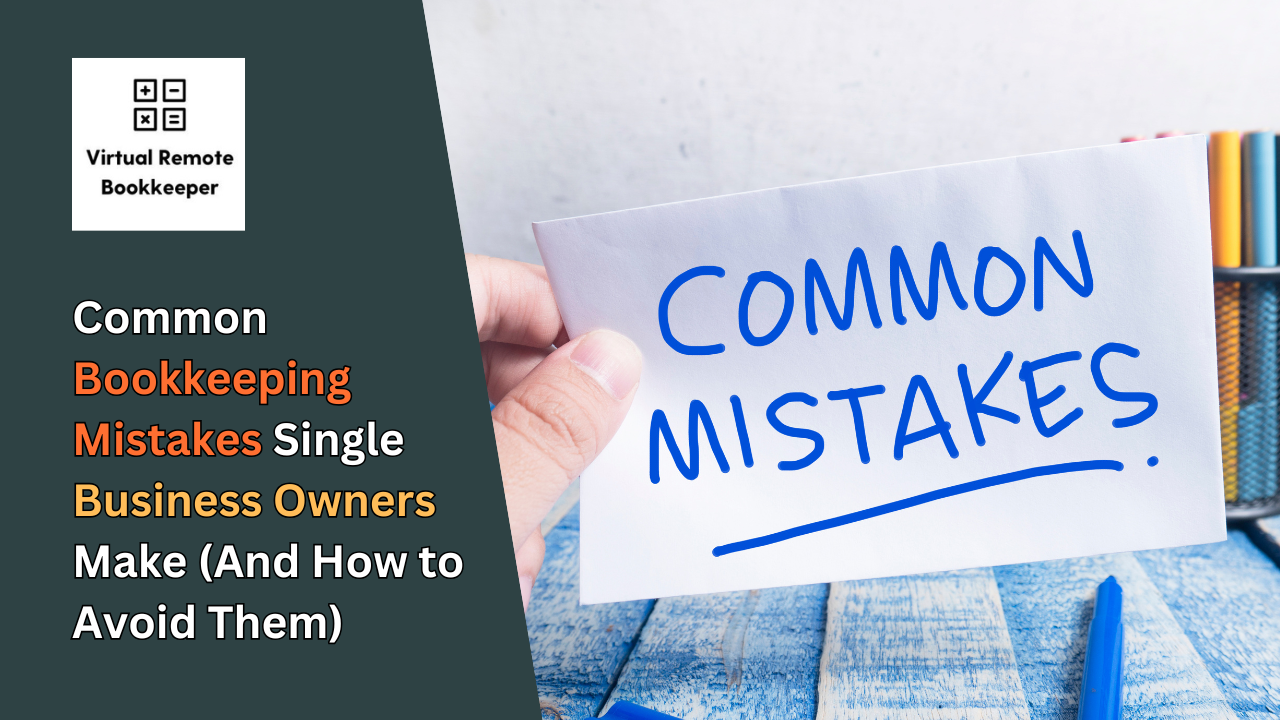
Bookkeeping is an essential part of running a successful business, yet many single business owners struggle with it. The lack of a dedicated finance team often forces entrepreneurs to juggle multiple responsibilities, leading to common bookkeeping mistakes. These errors can cause cash flow problems, tax issues, and even legal troubles if not addressed promptly. In this blog, we will discuss the most common bookkeeping mistakes single business owners make and offer practical tips to avoid them.
1. Mixing Personal and Business Finances
One of the most frequent mistakes is combining personal and business finances. Many small business owners use the same bank account for personal and business transactions, making it difficult to track expenses and revenue accurately.
How to Avoid This:
- Open a dedicated business bank account.
- Use separate credit cards for personal and business expenses.
- Consider using a software tool like Zoho Bookkeeping to manage transactions efficiently.
2. Failing to Keep Receipts and Records
Keeping receipts and maintaining accurate records is crucial for tax purposes and financial reporting. However, it’s easy to misplace receipts or forget to log transactions.
How Remote Bookkeepers Save Solopreneurs Time and Money
How to Avoid This:
- Use digital tools to scan and store receipts.
- Regularly update your bookkeeping records, ideally weekly.
- Consider cloud-based solutions that integrate with accounting systems.
3. Not Reconciling Bank Statements
Bank reconciliation ensures that your financial records match your bank statements. Neglecting this step can lead to unnoticed errors or fraud.
How to Avoid This:
- Reconcile your accounts monthly.
- Use accounting software that automates the reconciliation process.
- Seek professional help if needed, such as accounting services tailored for small businesses.
4. Incorrectly Categorizing Expenses
Misclassifying expenses can result in inaccurate financial statements and potential issues during audits.
How to Avoid This:
- Familiarize yourself with common expense categories.
- Use bookkeeping software that automatically suggests categories based on the type of transaction.
- Consult with a professional bookkeeper if you’re unsure.

5. Delaying Bookkeeping Tasks
Procrastination can turn small tasks into overwhelming projects. Delayed bookkeeping often leads to errors and missed deadlines.
How to Avoid This:
- Set aside time each week for bookkeeping tasks.
- Automate repetitive tasks using tools like Zoho Bookkeeping.
- Partner with a virtual bookkeeper to stay on top of your finances.
6. Ignoring Tax Deadlines
Missing tax deadlines can lead to penalties and interest charges, affecting your cash flow and profitability.
How to Avoid This:
- Mark tax deadlines on your calendar.
- Hire a tax professional or a bookkeeping service to handle filings.
- Regularly review your financial records to ensure readiness for tax season.
7. Not Tracking Accounts Receivable and Payable
Failing to monitor accounts receivable (money owed to you) and accounts payable (money you owe) can disrupt cash flow.
How to Avoid This:
- Use software to track invoices and due dates.
- Implement a reminder system for overdue payments.
- Conduct monthly reviews of your accounts receivable and payable.
8. Overlooking Small Transactions
Small transactions may seem insignificant but can add up over time, leading to discrepancies in your books.
How to Avoid This:
- Record all transactions, no matter how small.
- Use integrated payment systems to log transactions automatically.
- Regularly audit your financial records for completeness.
9. Relying Solely on Manual Processes
Manual bookkeeping increases the risk of human error and inefficiency.
How to Avoid This:
- Invest in reliable bookkeeping software.
- Automate repetitive tasks like invoice generation and bank reconciliations.
- Consider hiring virtual bookkeeping services for expert assistance.
10. Neglecting Professional Help
Many single business owners try to handle everything themselves, including bookkeeping, which can lead to costly mistakes.
How to Avoid This:
- Understand when to delegate financial tasks.
- Hire a professional bookkeeper for complex financial management.
- Explore virtual bookkeeping solutions, such as the ones provided on the Virtual Remote Bookkeeper blog, for expert insights.
Benefits of Avoiding Bookkeeping Mistakes
By avoiding these common bookkeeping mistakes, you can:
- Maintain accurate financial records.
- Improve cash flow management.
- Ensure timely tax compliance.
- Reduce stress and focus on growing your business.
How Virtual Remote Bookkeeper Can Help
At Virtual Remote Bookkeeper, we specialize in helping single business owners streamline their bookkeeping processes. From managing day-to-day transactions to providing comprehensive accounting services, we’re here to support your financial needs.
Why Single Business Owners Are Switching to Virtual Bookkeeping Services
Explore our accounting services or contact us to learn how we can make bookkeeping easier for your business.
Final Thoughts
Bookkeeping mistakes are common but avoidable. By implementing best practices and leveraging professional support, single business owners can maintain accurate financial records, comply with tax laws, and focus on their core business activities. Don’t let bookkeeping errors hold you back—take action today to protect and grow your business.
For more insights, visit our blog or reach out for personalized advice.
